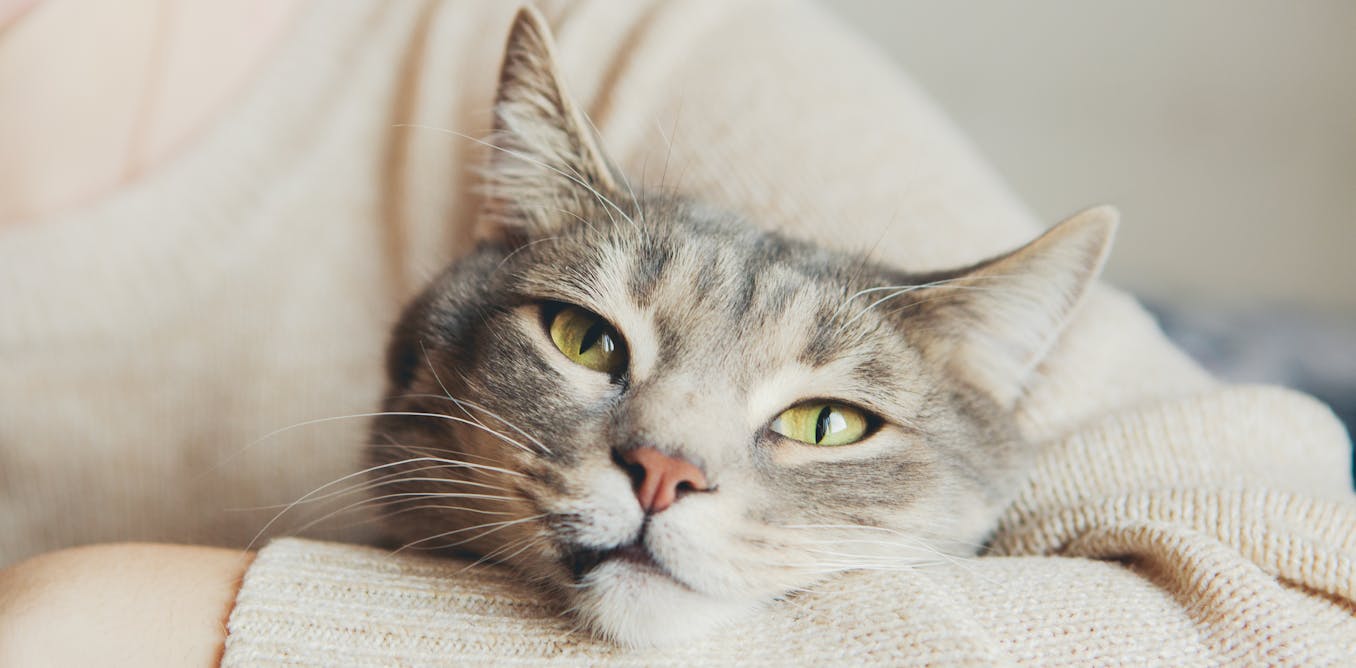[ad_1]
As we grieve the lack of a pet, we might not be the one ones feeling the ache. Analysis is displaying that cats who’re left behind when one other animal of their residence dies may very well be mourning together with us.
Grief is a well-documented human response to loss – however its roots could also be way more historical as some scientists imagine it advanced in extinct species of people. Corvids – members of the crow household – primates, and marine mammals like dolphins and whales, have all been noticed to vary their behaviour when one in every of their very own dies, from carrying useless offspring for days, to staying shut by the physique, as if preserving vigil.
One idea is that grief is a by-product of the pure stress response to separation seen in social animals. In line with this concept, misery and looking behaviour most likely advanced to encourage animals to reunite with misplaced group members, which was helpful for survival. These responses persist when separation is everlasting, like in dying, resulting in the enduring ache of grief.
Whereas there’s loads of analysis on how dropping a pet impacts people, a lot much less is thought about how cats deal with loss, one thing current analysis by US-based comparative psychologists Brittany Greene and Jennifer Vonk investigated.
Not like typical social species, the cat’s wild ancestor was largely solitary. Nonetheless, domestication has reshaped their behaviour, enabling them to dwell in teams and kind social bonds.
Inexperienced and Vonk’s examine means that cats can grieve the lack of a fellow pet. Of their examine of 452 cats, many displayed indicators of misery, equivalent to elevated attention-seeking, vocalising and lowered urge for food, following the dying of a companion. The examine discovered that the energy of the bond between the animals, their time spent collectively, and each day interactions have been key elements on this grief-like behaviour.

Julia Cherk
This examine builds on earlier analysis by animal welfare researcher Jessica Walker and her crew in 2016, which examined how cats and canine react to the lack of a companion. Walker’s examine, carried out in New Zealand and Australia, discovered that 75% of surviving pets confirmed noticeable behavioural adjustments, with cats displaying elevated affection, clinginess and anxiety-related vocalisations.
It must be famous that each research relied on proprietor perceptions to evaluate adjustments in pet behaviour, which presents a possible downside. Whereas pet house owners are sometimes essentially the most attuned to delicate adjustments of their animals, their observations may be influenced by their very own grief and emotional state.
Is it actually grief?
There may be another clarification for adjustments in behaviour the house owners in research noticed after a companion’s dying. The presence of a deceased animal can sign hazard within the setting, inflicting pets to vary their behaviour as a security measure, slightly than being a grief response.
Though this hasn’t been studied in home cats, 2012 analysis on western scrub-jays revealed that seeing a useless member of their species can immediate alarm calls and behavior geared toward avoiding hazard, very like how they’d react to a predator.
Equally, a 2006 examine on bumblebees discovered that they have been much less prone to go to flowers that contained a freshly killed bee or its scent, most likely decreasing their very own danger of being attacked.
This means that what we interpret as grief would possibly, in some instances, be a survival intuition. Some behaviour the house owners within the research seen after the dying of a companion, equivalent to their cat hiding or in search of increased vantage factors, may assist this concept.
A query you may be asking is whether or not cats mourn the deaths of their house owners. Although we want to suppose that our cat would mourn our dying, on the minute, we merely don’t know. There appears to be little to no analysis on how cats react to the dying of their proprietor.
One unsettling behaviour that has been effectively documented upon dying of an animals’ proprietor is the consumption of their stays. Whereas cats usually get a nasty fame for this, canine lovers ought to observe that each cats and canine have been identified to scavenge human stays.
In actual fact, pet canine are extra regularly documented doing so. Some scientists recommend this behaviour would possibly stem from starvation, nevertheless it has additionally occurred when meals was plentiful.
One other idea, higher aligned with the concept of grief, is that scavenging would possibly begin as an try and revive an unresponsive proprietor. When nudging or licking doesn’t work, the animal could escalate to nipping or biting in an effort to rouse them.
So the jury continues to be out on whether or not cats grieve in response to loss, or if are they responding to adjustments of their setting that we’ve but to totally perceive.
[ad_2]
